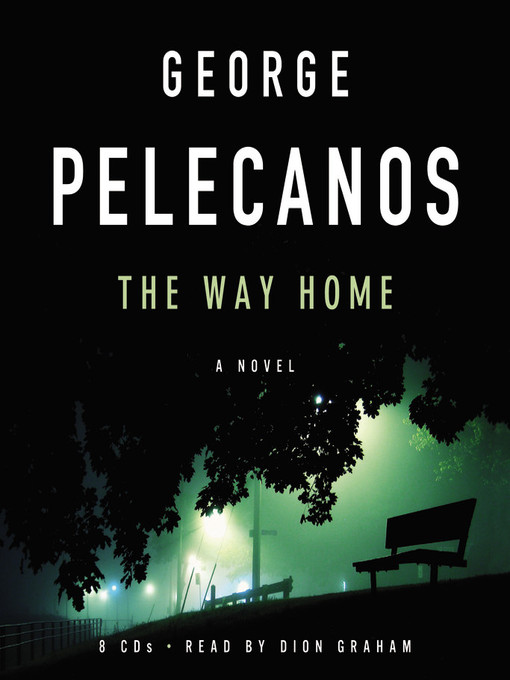
The Way Home
کتاب های مرتبط
- اطلاعات
- نقد و بررسی
- دیدگاه کاربران
نقد و بررسی

George Pelecanos rips a life, actually several lives, from a Washington, DC, ghetto and lays them bare for everyone to see--and understand. Christopher Flynn is a confused white kid with a chip on his shoulder and a bleak future. Despite the odds, he changes his life for the better after a stint in juvenile hall. But trouble comes knocking when a friend finds a bag of money. Reader Dion Graham pulls the listener into the story with his earnest delivery and streetwise patter. Graham gives each character a distinctive voice, even managing to talk like a white kid trying to talk like a black kid. His work is as engaging and powerful as the book, a perfect pairing. M.S. Winner of AudioFile Earphones Award (c) AudioFile 2009, Portland, Maine

March 23, 2009
Bestseller Pelecanos (The Turnaround
) probes the volatile and fragile relationship between a father, Thomas Flynn, and his son, Chris, in this less than satisfying effort. As a rebellious teen into drugs, Chris had minor brushes with the law and did a stint in juvenile prison. Now 26, he’s working for his father’s D.C.-area carpet installation business and staying clean. Still, Thomas remains disappointed in his son’s lack of achievement or ambition, and Chris remains resentful that he’s not accepted for who he is. A rather tired device, a bag of stolen money found by Chris and a friend and fellow former inmate, serves to set in motion a chain of actions that will lead to critical decisions for both Flynns. Pelecanos adroitly sketches the obstacles and temptations that face juvenile offenders in and after prison, but this novel, with its dispassionate style, never manages to generate high suspense or evoke much sympathy for its characters. Author tour.

May 1, 2009
Pelecanos mines familiar territory in his new novel about the strained relationship between a father and son in Washington, DC. Chris Flynn disappointed his father terribly when, after a string of juvenile crimes, he finally committed one serious enough to land himself in Pine Ridge, a facility for juvenile offenders. Now an adult, Chris is working for his father's carpet installation company, leading a clean life and hoping to earn his father's respect. Trouble comes in the form of $50,000 found at a job site and someone from Chris's Pine Ridge past. While Pelecanos has a knack for strong characterization and a clear sense of place, the similarities to his work on HBO's "The Wire" and his recent "The Turnaround" make this novel somewhat of a disappointment to regular fans.Julie Elliott, Indiana Univ. Lib., South Bend
Copyright 2009 Library Journal, LLC Used with permission.

Starred review from April 15, 2009
A crime novel, yes, but the talented Pelecanos (The Turnaround, 2008, etc.) shoves it out of its comfort zone.
He needn't worry, 17 year old Chris Flynn brashly assures his father as the door of Pine Ridge Reformatory is about to shut behind him:"I know how to jail." How did Chris get there, decently brought up kid that he is—loving parents, solid middle-class home? He has no idea. Oh, he can talk about"Good Chris, Bad Chris," but that riff no longer satisfies the way it once did. All he knows for sure is that Bad Chris brought him within an inch of killing someone during a wild, drug-filled night that ended with a string of exasperated D.C. cops running him down. Thus his sentence to Pine Ridge, leaving a frustrated father and a heartbroken mother wondering where they went wrong. Unexpectedly, however, Pine Ridge proves to be a way of starting over. Bleak and dehumanizing though it is, Chris grows up there, copes with adversity, makes better friends, keeps Bad Chris caged. Ten years later, he's put a life together. He has a worthwhile girlfriend. His always thorny relationship with his father is at least manageable. Lulled, he thinks the past is safely buried. But when a pair of killers show up claiming he has something that belongs to them, Chris learns how inexorably the past is prologue.
Redemption the hard way, well-crafted and deeply felt.
(COPYRIGHT (2009) KIRKUS REVIEWS/NIELSEN BUSINESS MEDIA, INC. ALL RIGHTS RESERVED.)

April 1, 2009
Pelecanos last novel, The Turnaround (2008), reflected a sea change for the celebrated author, one that has been gathering strength over the last few years. Rather than following the downward track of characters trapped in the inner-city quicksand of poverty, ignorance, and prejudice, he would tell stories about individuals who, through a combination of luck, circumstance, and determination, were able to chart new courses for themselves. This time its Chris Flynn, a bad kid from a good family in Washington, D.C., who endures the soul-deadening experience of juvenile prison but, with the help of caring parents, emerges with a chance at a life outside the cycle of violence into which he fell as a teenager. Then, on a carpet-laying job, he and a coworker, a friend from juvie also committed to the straight life, find a satchel of money; they return the loot to its hidey-hole, but like an evil magnet, it draws them back into the world they thought theyd escaped. Pelecanos has always been a master at building tension through a sense of inevitability, showing his readers the collision course down which his characters careen while at the same time making us feel their powerlessness to jerk the wheel. Now, as in The Turnaround, Pelecanos charts two parallel courses: the collision to comeand a possible way home. If the narrative arc of this novel is a little too similar to its predecessor to be completely satisfying, it still packs a strong emotional wallop while reminding us that its possible to tell stories of tentative hope with the same unflinching honesty as those of utter hopelessness.(Reprinted with permission of Booklist, copyright 2009, American Library Association.)

























دیدگاه کاربران